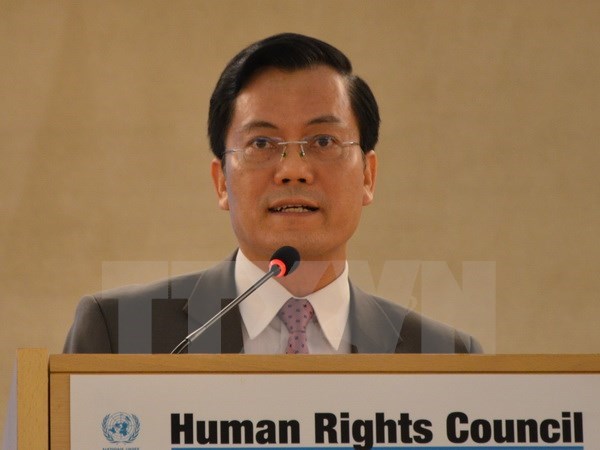ID :
437955
Thu, 03/02/2017 - 03:16
Auther :
Shortlink :
http://m.oananews.org/index.php//node/437955
The shortlink copeid
Official highlights Vietnam’s contributions to global human rights initiatives

Geneva, March 2 (VNA) – Vietnam has contributed to a wide range of international and regional initiatives on human rights and other issues, including efforts to respond to global challenges, according to Deputy Foreign Minister Ha Kim Ngoc.
He made the remark while delivering a speech at a meeting of the 34th session of the United Nations Human Rights Council (UNHRC) in Geneva, Switzerland, on February 28.
The session was attended by UN Secretary-General Antonio Guterres, President of the UN General Assembly in the 71st session Peter Thomson, and representatives of more than 110 countries and international organisations.
In his address, Ngoc underlined his country’s priorities and initiatives at the UNHRC, including the co-sponsorship of a resolution on climate change and children’s rights, and a series of events relating to vulnerable groups, from the way to create an enabling working environment for disabled people to ensuring the rights of people working at sea, and enhancing education in combating trafficking of women and girls.
Vietnam will continue efforts to “make the UNHRC an effective body in their noble mission of building a better planet for everyone,” he stressed.
Talking about challenges to Vietnamese people’s rights, he said: “This is the challenge of successfully restructuring our economy and reforming growth model while ensuring that every Vietnamese can enjoy the fruits of development and human rights in all aspects.”
The official noted that Vietnam continued legal reforms by passing legislation on human rights last year, carried out a national plan to implement the accepted Universal Periodic Review recommendations, and adopted plans on the implementation of the 2030 Agenda for Sustainable Development and the Paris Agreement on climate change.
Efforts have also been made to assist people in areas affected by natural disasters, as well as to build long-term measures to preserve environmental sustainability, he added.
Vietnam and other ASEAN members are building a people-centred ASEAN Community, making the bloc a region of peace, stability, development and cooperation, Ngoc said.
He asked the UNHRC to encourage more discussions on issues affecting people’s daily lives, which are the rights to food, adequate housing, decent work, right to health and education, to name a few, while ensuring ties between the protection of human rights, the promotion of development, and the maintenance of peace and security and respect for international law.
The UNHRC and the UN should promote the role of multilateralism, dialogue and cooperation in dealing with human rights issues and global challenges, he added.
At a panel discussion on February 27, the Deputy Foreign Minister called on the UN’s development system to support countries in ensuring the rights of vulnerable groups in peace building processes.
He said: “Vietnam stands ready to share our post-war experiences in rebuilding the country while ensuring the needs of our people.”
On the sidelines of the UNHRC’s 34th session, Deputy Foreign Minister Ngoc had a working session on gender equality with the Australian Minister for International Development and the Pacific and met with the Foreign Minister of Georgia, the UK Minister for Asia and the Pacific, the Uruguayan Deputy Foreign Minister, and the Polish Deputy Foreign Minister.
At the meetings, the politicians discussed bilateral cooperation, especially in economy, trade and investment, along with global and regional issues of shared concern.
The Vietnamese side also detailed the East Sea situation, emphasising the principle of not using or threatening to use force, resolving disputes peacefully on the basis of international law, including the 1982 UN Convention on the Law of the Sea, and fully respecting diplomatic and legal processes.
Participating officials expressed the wish to strengthen ties with Vietnam and echoed the country’s viewpoint in settling regional disputes, including the East Sea issue./.





